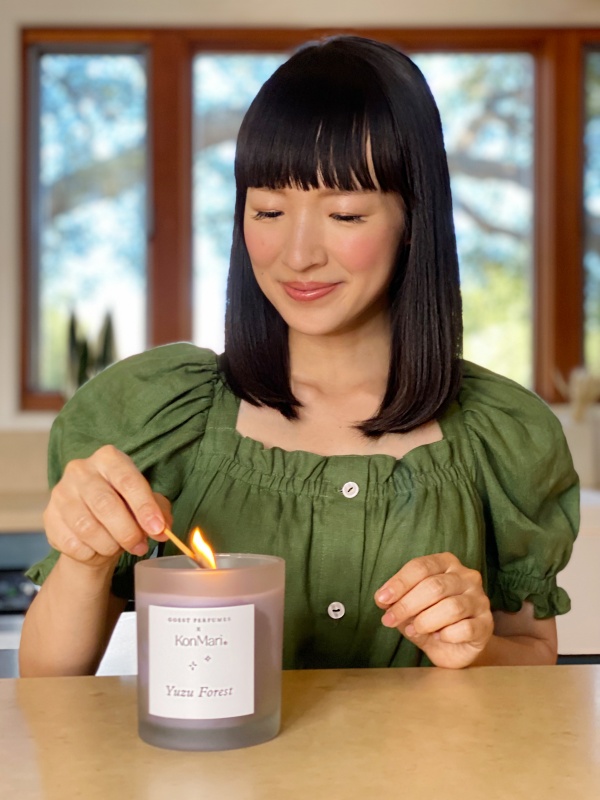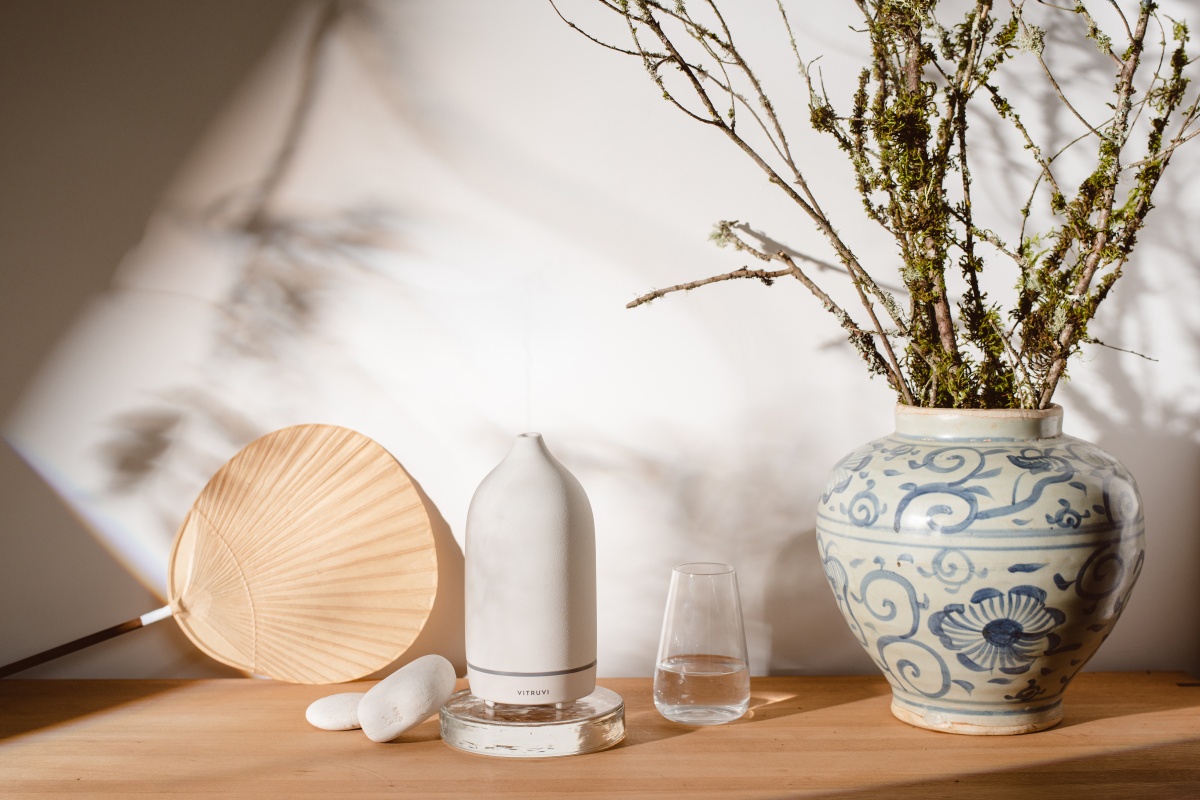Scent plays a central role in a life well-lived. It not only adds depth to our experiences but encourages a deeper connection with the world around us. In Japan, the traditional art of kōdō — which means “way of incense” or “way of fragrance” — celebrates the power of scent through the ritual of burning incense. The practice reminds participants of a simple truth: We are what we breathe.
To align space, body and mind, Marie often burns incense or includes aromatherapy in her self-care routines. By using scent as a guide, we can spark new joy in every aspect of our lives. Below are some ways to elevate your own rituals by harnessing the power of scent.
The power of scent is not only rooted in tradition but also in science. For Gretchen Rubin, the New York Times bestselling author and renowned happiness expert, the power of scent can fundamentally change our lives. In her forthcoming book, Life in Five Senses: How Exploring the Senses Got Me Out of My Head and Into the World, Rubin is back with a deeper exploration of life, happiness and connection — all through a deeper understanding of the senses.
Here is Rubin on the science behind the power of scent and its potential to change how we perceive and experience the world.
How Scent Transforms Our Lives
Smell Directly Affects Our Emotions
Scent plays an influential role in how much we enjoy food and drink, but it goes much deeper than that. Many of us know that a familiar scent can bring back memories (a classic example is the Proustian madeleine), but it can also send signals to the brain that affect our emotions and heighten our sense of pleasure.
“Our ability to smell arises from specialized sensory receptor cells located high inside the nose,” writes Rubin. “When a pizza box flips open, microscopic molecules pass through the nostrils and stimulate those receptors, which send electrical signals to the olfactory bulb located in the brain,” writes Rubin. “From there, the signal is relayed to other brain areas for identification, associations with memory and emotion, and sensory integration…This process plays a crucial role in allowing us to experience the pleasures of food and drink.”
Scent Can Shift Our Behaviors
Scent has the added benefit of drawing us back into the present, so it can be particularly beneficial for mindfulness rituals. We can also use scent when we’re tempted to over-indulge one of our other senses, such as taste, out of stress or boredom.
In her book, Rubin writes that in exploring the senses, she “discovered [a] helpful pattern: When one of my senses was particularly satisfied, I felt less desire to stimulate the other senses. When I felt like snacking out of boredom, if I put on perfume or did something else to gratify one of my senses, my impulse to snack faded away.”
During times of frustration, anxiety or compulsion, scent can help us realign our impulses and ground us.
We Can Train Our Sense of Scent to Build Mindfulness
Rubin writes that paying closer attention to smell can bring more mindfulness into our lives. Scent is ephemeral — we experience it only in the present moment — making it an opportunity for sense-based meditation.
“Evanescence is a distinctive quality of a scent. We can’t smell it over and over; we can’t bookmark it, rewind it, stockpile it, or save it for later,” writes Rubin. “Explicitly training my attention on the smell of a shoe store or the lobby of my daughter’s school gave me a sense of being present, of being exactly where I was, right then.”

Scent Can Help Us More Deeply Connect with Memories
The KonMari Method™ encourages letting go of mementos that don’t spark joy because we don’t need objects to honor our memories. In fact, they often prevent us from engaging more deeply with those memories.
Rubins says scent can help us connect with the past more regularly — often when we least expect it. “I was also more aware of how scent could evoke the past, and I paid attention to any memories that floated up,” she writes. “On a neighborhood walk, I passed a construction shed—and the woody, slightly dank smell conjured up scenes of summer camp and the fun I’d had in those flimsy, overstuffed cabins.”
How to Use Scent Every Day
“The sense of smell, like all the senses, gives us valuable information about our environment,” writes Rubin. “It alerts us to smells that we’ve learned to associate with danger, like fire…as well as to enticing possibilities, like a new car and a used bookstore.”
But we can also consciously use scent daily to heighten joy-sparking experiences. To align space, body and mind, Marie often burns incense or includes aromatherapy in her self-care routines. By using scent as a guide, we can spark new joy in every aspect of our lives. Below are some ways to elevate your own rituals by harnessing the power of scent.
For Awakening: Citrus
Marie believes that a dedicated morning ritual sets the rhythm for the day. She often begins her day by opening a window to let in the fresh air, then lighting incense. Even a few minutes of mindfulness can make a profound difference in our mindset. The KonMari Method™ includes envisioning your ideal lifestyle — you can use these first waking moments, in a space where we feel joy, to open your mind to what lies ahead.
For awakening, Marie suggests a scent such as grapefruit, mandarin, or — a favorite in Japan — yuzu. The smell of citrus brings energy and ease. It clears the mind of lingering fatigue and encourages us to meet the day joyfully.
For Healing: Garden
Incense and essential oils have been used across cultures and for centuries to treat various ailments — hence the term aromatherapy. A restorative scent can relieve a headache, calm irritated skin and even help fight off a winter cold. For hard days that call for a complete reset, soaking in an herbal bath can quiet both the body and mind.
Herbal scents, in particular, are known for their healing properties. Oregano is often used for fighting common colds while peppermint can help an upset stomach or headache. For stress or fatigue, rose and chamomile are known for providing relief and balancing the mind.
For Purifying: Forest
You can often make familiar spaces feel more joyful simply by clearing the air. After completing a tidying festival, burning incense can invite new energy in.
There are opportunities to introduce scent into your daily tidying rituals as well. Adding essential oils to laundry and cleaning products fills the home with a custom scent. For high-traffic areas, an essential oil diffuser can help create a tranquil atmosphere — even on busy weeknights.
For detoxifying and cleansing, try starting with a wood blend. Sandalwood is known for its ability to clear the air as well as its antibacterial qualities, while the scent of hinoki — or Japanese cypress — encourages deep, thoughtful breaths.
For Transitions: Florals
When learning to set clearer boundaries between different aspects of our lives, scent provides a welcome reminder. Whether it’s closing your laptop or opening your nightly gratitude journal, a transitional scent can help you shift focus.
Florals, in particular, can help us transition. Much like a well-tended garden encourages rest and reflection, a blend of rose or jasmine reminds us to take a mindful break and make space for joy.
Then, there is the final transition of the day: sleep. One of Marie’s favorite ways to use scent is in her nighttime routine. For drifting joyfully to sleep, try a lavender blend. By inhaling an essential oil, soaking in a scented bath, or spritzing pillows with an aromatherapy spray, we signal to our minds that the day has come to an end.








